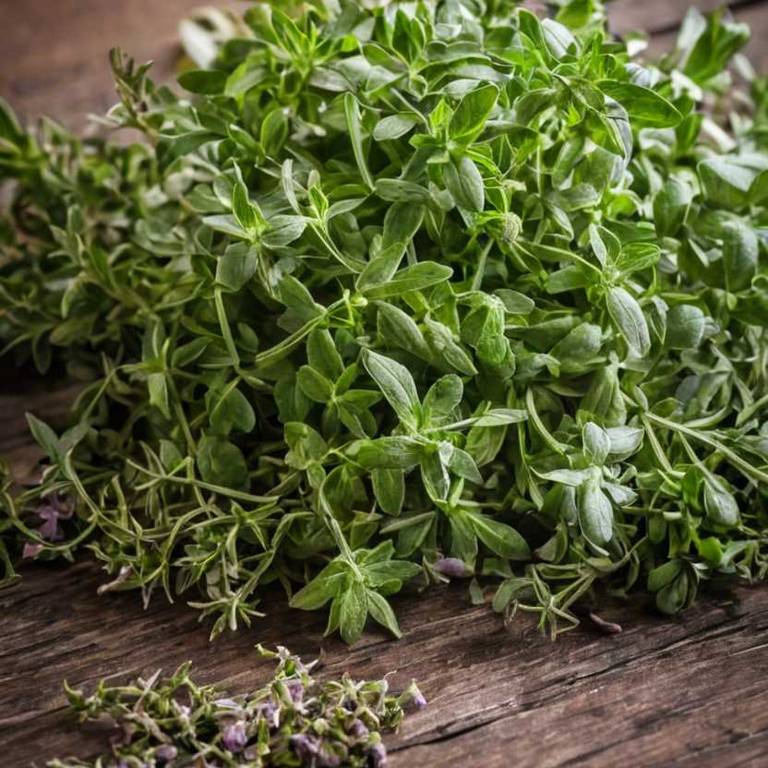By Leen Randell
Updated: Jul 05, 2024
What Are The Medicinal Properties Of Thymus Vulgaris (Thyme)?

Thymus vulgaris, also known as thyme, has health benefits such as reducing inflammation and fighting off respiratory infections.
Its medicinal constituents include carvacrol, thymol, and rosmarinic acid, which are responsible for its antimicrobial and antiseptic properties. Thyme is used in various medicinal preparations, including teas, infusions, and topical creams, to treat sore throats, coughs, and skin conditions. However, excessive consumption may cause stomach upset and interact with certain medications.
Caution is advised when using thyme, especially in pregnant or breastfeeding women, as it may stimulate uterine contractions.
This article explains the health benefits, active constituents, medicinal preparations, possible side effects, and precautions related to Thymus vulgaris.
What are the health benefits of Thymus vulgaris?
Thymus vulgaris, also known as thyme, has health benefits such as reducing inflammation and fighting off infections.
The antibacterial properties of thyme have been used to treat respiratory issues like bronchitis and coughs, while its antifungal properties have helped to combat yeast and fungal infections. Additionally, thyme contains antioxidants that may help to protect against cell damage and promote overall well-being.
Its health benefits make it a popular choice for natural remedies.
Here's a detailed article about the 10 health benefits of Thymus vulgaris.
What are the active constituents of Thymus vulgaris?
Thymus vulgaris, also known as thyme, has active constituents such as thymol, carvacrol, and rosmarinic acid, which possess antimicrobial and anti-inflammatory properties.
Thymol, a phenolic monoterpene, is responsible for thyme's antiseptic and antifungal effects, while carvacrol exhibits antioxidant and antiviral activities.
Rosmarinic acid, a polyphenolic compound, has been shown to have anti-inflammatory and antineoplastic properties, making thyme a valuable medicinal plant.
Here's a detailed article about the 10 active constituents of Thymus vulgaris.
What are the medicinal preparations of Thymus vulgaris?
Thymus vulgaris, also known as thyme, has medicinal preparations such as thymol, a volatile oil extracted from its leaves.
Thymol is an antiseptic and antibacterial agent used in oral and wound disinfections.
Thyme oil, in turn, is used in aromatherapy for its anti-inflammatory and antimicrobial properties, and as an expectorant in respiratory tract infections, such as bronchitis and coughs.
Here's a detailed article about the 10 medicinal preparations of Thymus vulgaris.
What are the possible side effect of using Thymus vulgaris improperly?
Improper use of Thymus vulgaris, also known as thyme, increases the chances of experiencing side effects such as digestive issues, nausea, and allergic reactions in some individuals.
Thyme essential oil can cause skin irritation, especially when applied topically undiluted.
Furthermore, consuming excessive amounts of thyme tea or oil can lead to an imbalance of potassium levels in the body, potentially causing muscle weakness and heart issues.
Here's a detailed article about the 10 most common side effects of Thymus vulgaris.
What precautions to take when using Thymus vulgaris medicinally?
Before using Thymus vulgaris, also known as thyme, for medicinal purposes, you must take precautions such as consulting a healthcare professional, especially if you're pregnant, breastfeeding, or taking medications.
Also, be aware of potential interactions with antacids, blood thinners, and diabetes medications.
Additionally, use high-quality, organic thyme essential oil that has been diluted to a safe concentration to avoid skin irritation or allergic reactions.
Here's a detailed article about 10 precautions to take when using Thymus vulgaris.